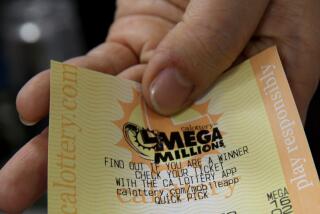Staff Urges Caution on Lottery Dial-a-Bet Idea
- Share via
State Lottery Commissioner William Johnston wants to give Californians the opportunity to bet their lucky numbers by telephone in the comfort of their own homes, but a lottery staff report presented at Monday’s commission meeting urged officials to approach such a system with caution.
“I really think it has great potential,” Johnston said of the dial-a-bet scheme, which is being urged by some lottery suppliers. “I’m one of those that leans toward the telephone as an important part of our lottery.”
Because gambling debts are not legally collectable, Johnston acknowledged after the meeting, dial-a-bet players would have to pay for their wagers well in advance of punching out their numbers on touch-tone phones. “The key,” Johnston said, “is there are 5 million touch-tone phones out there. . . . Those funds (advance bets) would go immediately to the lottery and we would have the interest.”
Lottery staff member Stan Rosenstein told the commission, however, that although telephone betting appears technically possible, no other state lottery uses such a system.
“This would have California breaking ground,” he said.
Rosenstein also asked the commissioners to consider an ethical question:
“Does use of the phone,” Rosenstein asked the commission, “make the lottery too accessible?”
In addition, Rosenstein cautioned that phone lines might become overburdened during periods of “lotto-mania” when the lottery jackpot hits multimillion-dollar levels.
“We could have a Mother’s Day situation,” he said.
The dial-a-bet plan is still under study by the commission staff.
Johnston and the lottery staff also failed to see eye to eye on the question of who should fill the estimated 250 jobs of instant ticket agents serving lottery retailers.
Johnston, retired superintendent of the Los Angeles Unified School District, was visibly miffed that a verbal staff report to the commission failed to give a detailed response to his suggestion that retired public school administrators be hired as independent contractors for the jobs of agents. The agents would act as liaison officers between the state and private retailers of lottery tickets and, in some cases, would distribute the tickets to retail outlets.
The plan would aid the “credibility” of the lottery, Johnston contended, and would save the state benefit and retirement money by not placing regular civil servants in the jobs.
“The funds for the lottery go to public education,” he argued, “and it (hiring retired educators) would enhance the image of the lottery.”
(Last November’s state lottery initiative stipulates that public education receive at least 34% of gross sales.)
A commission staff report indicated, however, that Johnston’s plan would violate state Civil Service hiring procedures.
Private lottery industry firms have also expressed interest in filling the function of agents for the state. The matter is still under study by the commission staff.
Lottery officials plan to print 225,000 applications by May 31 for potential retailers of instant tickets. An estimated 20,000 such retailers will be needed to sell tickets throughout the state for an expected gross of $1 billion during the first year of sales.
The contract to supply the instant “scratch-off” tickets is to be awarded by the commission June 3 and ticket sales are scheduled to begin in September or October, about six months after the start-up date set by the lottery initiative.
More to Read
Sign up for Essential California
The most important California stories and recommendations in your inbox every morning.
You may occasionally receive promotional content from the Los Angeles Times.













